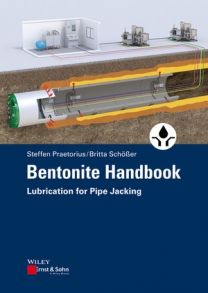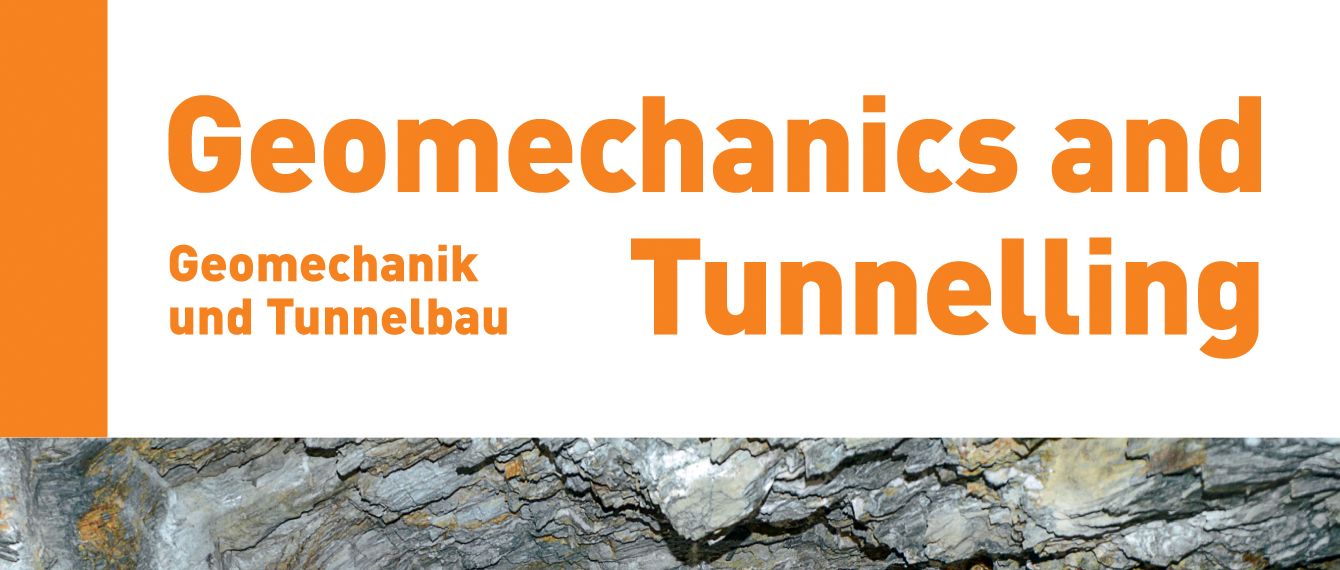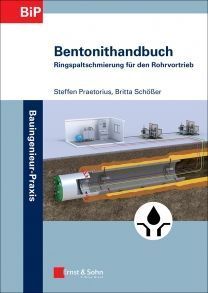1. Basics
The basics cover the essential technical components for annular gap lubrication in pipe jacking. The bentonite lubrication system and the associated equipment are explained. The functioning of the automatic lubrication systems is differentiated between interval-controlled and volume-controlled systems. The purposes of the bentonite suspension in the annular gap include the maintenance of the annular gap and the reduction of skin friction around the jacked pipe, with the requirements are given by the surrounding ground.
2. Bentonite and bentonite suspensions
Bentonite is a natural clay mineral and consists mostly of montmorillonite. This main ingredient is decisive for the physical properties of a bentonite suspension such as swelling susceptibility, card-house structure and thixotropy, and also for the rheological properties of a bentonite suspension such as yield limit, viscosity and gel strength. The stability of a suspension means the maintenance of its properties over a longer time period. Bentonite is differentiated into natural bentonites, activated bentonites and bentonites with polymer additives.
3. Additives
Additives and particularly polymers can produce or strengthen special properties in a bentonite suspension. These are differentiated into natural or synthetic polymers and are used as viscosity regulators, filtrate reducers, clay inhibitors, liquidisers or lubricants. In addition to the primary properties of the additives, secondary properties have to be considered. The relevant functioning methods of the polymers are clearly explained.
4. Correct preparation of bentonite suspensions
The production process is decisive for the quality of a bentonite suspension. Various factors have to be taken into account such as mixing and swelling times and the mixing sequence for the addition of more than one additives. It is often necessary to treat the mixing water with soda ash. In order to produce a well dispersed suspension, high-speed mixers are necessary, which put high shear energy into the mixing process. After mixing, various swelling items are to be observed, depending onj the bentonite product. In order to be able to provide the necessary volumes at the right time for a pipe jack, the swelling tank must be sufficiently large.
5. Properties of the suspension and measurement processes
For the monitoring of the rheological and physical properties of a bentonite suspension, special and usually standardised measurement processes such as the Marsh funnel, rotary viscometer, ball harp and filter press are used. Plastic viscosity, gel strength and apparent viscosity can be measured with the rotary viscometer. Statements about the stability can be derived from the filtrate water and the filter cake thickness. Further important parameters are density and the sand content. For the mixing water, the pH value, electrical conductivity and particularly the hardness should be measures in order to avoid negative effects of contaminants on the suspension quality.
6. Ground and groundwater
The ground conditions significantly determine the requirements for the lubricating suspension to be used. The basic categories are solid rocks and soils. The important parameters are grain size, voids ratio, groundwater conductivity, consolidation, consistency and stand-up time. Possible contaminations of soil and water are named and measures to ensure suspension quality are described.
7. Bentonite suspensions for annular gap lubrication
Annular gap lubrication means the keeping open of the excavated cavity and reduction of skin friction between ground and jacked pipe. Important factors are the annular gap size, the position of the jacked pipe in the cross-section and the suspension volume to be injected. The various methods of functioning of the bentonite suspension are explained and related to the geological ynd hydrogeological conditions. The influence of suspension properties like particle size, yield limit, viscosity and gel strength are described in detail and various lubrication strategies are presented.
8. Lubrication technology
In addition to the explained approaches to various lubrication strategies, the necessary lubrication technology is summarised. various possible arrangements and spacings of the lubrication points in the pipe string and the corresponding injection fittings at each lubrication point are described. In addition, special features such as non-return valves in the injection outlets, the interaction between face support and pressure in the annular gap, the bentonite supply in the starting area and the handling of lubricant pressure and quantities and pressure loss are described in detail.
9. Reporting
For practical application on site, the verification and documentation of the measured properties during the advance are just as important as the maintenance of a uniform suspension quality. Example forms show the possibility for continuous monitoring of parameters such as yield limit, viscosity, gel strength and stability.
10. Lists of the required injection quantities
The bentonite quantity to be injected depends on the ground and the external diameter of the pipe. The pumping rate then depends on the advance rate and the tunnel length. These relationships have been calculated depending on the ground and the advance rate for usual jacked pipes and are illustrated clearly.



